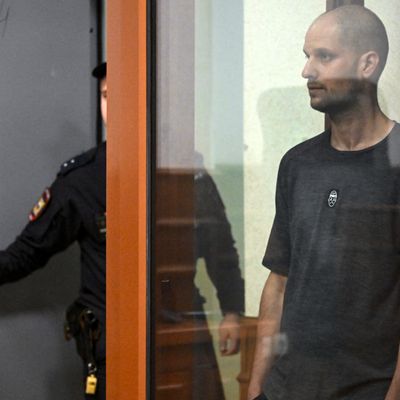
This post was updated on August 6 to reflect further developments.
How did Bloomberg beat The Wall Street Journal and the rest of the press corps on one of the most watched stories in the world: the release of Journal reporter Evan Gershkovich and former U.S. Marine Paul Whelan from Russia?
At 7:41 a.m. on August 1, Bloomberg published its scoop about the prisoner swap. Ten minutes later, a Bloomberg editor posted proudly on X, “It is one of the greatest honors of my career to have helped break this news. I love my job and my colleagues.” Then, at 8:59, the piece was updated to read, “An earlier version of this story was corrected to reflect that the Americans have not been released yet.” The Journal itself didn’t publish it until just after 11 a.m., when its reporter and other Americans — whose freedom had been negotiated by the U.S. government as part of an extremely complicated, 24-person swap across multiple countries — actually deplaned in Turkey.
According to multiple sources at the Journal and other major outlets, the Bloomberg scoop left journalists and government officials fuming. With a prisoner swap, you don’t know if it’s going to happen until it happens. (As one Journal reporter put it, “We literally had Yaroslav Trofimov on the ground with binoculars waiting to see Evan come off the plane, and we pubbed as soon as that happened.”) Which means Bloomberg’s story proclaiming Gershkovich was free was inaccurate given that the Russian plane was still in the air at the time. That plane could have just turned around and gone back to Moscow, which is why the Journal and other publications had agreed to hold off.
“Incensed” is how one reporter whose outlet had agreed to an embargo — i.e., delaying publishing what it knew — reacted to Bloomberg’s decision: “People are very, very disappointed in Bloomberg. And not just the embargo breaking, but the football spiking.” (The Bloomberg editor’s X post was later deleted.) Another reporter added, “We all want to break stories. We also need to consider the risks of breaking those stories. I hope editors and reporters thought long and hard about the risks of revealing the details of a hostage transfer before the hostages were back in U.S. custody.”
For days, various media outlets had been aware — through their own reporting and as information trickled out elsewhere — that a prisoner swap involving American journalists and dissidents was in the works. But news organizations were asked by the White House to hold their stories until Gershkovich et al. were in U.S. custody. Until then, the prisoners would still be in Russian captivity, and officials feared that any attention brought to the fragile deal could risk compromising it — not just for the U.S. but for the multiple other countries whose prisoners were freed as part of the swap. News outlets found this compelling and agreed. In exchange for their agreement to the embargo, journalists were briefed ahead of time and given useful information for their reporting.
Including Bloomberg. In multiple emails with a White House official in the 48 hours leading up to publication, one of the Bloomberg reporters who would byline the eventual scoop clarified that they agreed to hold their stories and were aware that other outlets that had similar information were also holding back. By the evening of July 31, it was clear that some kind of prisoner swap would be happening as early as the next day and that the White House was preparing, inviting about 30 reporters to a background briefing at 8 a.m. on August 1.
Reporters received more information during that briefing, the understanding, again, being not to report the details until the prisoners were in U.S. custody. But Bloomberg by that time had already run its scoop.
A spokesperson for Bloomberg News declined to comment. The White House also declined to comment.
On August 5, Jennifer Jacobs — one of the two reporters who bylined the overhasty Gershkovich scoop — left Bloomberg, and the editor who tweeted it out was demoted. That day, Bloomberg editor-in-chief John Micklethwait told staff that Bloomberg had “prematurely” published its story on Gershkovich and the other prisoners’ release in a “clear violation” of editorial standards. Following an internal investigation, Bloomberg took “disciplinary action against a number of those involved,” Micklethwait wrote, adding that “this was clearly [the WSJ’s] story to lead the way on.” (Bloomberg staffers are not represented by a union.) Jacobs issued her own statement on the evening of August 5, saying she had “worked hand in hand with my editors to adhere to editorial standards and guidelines” in reporting the story. “At no time did I do anything that was knowingly inconsistent with the administration’s embargo or that would put anyone involved at risk,” she added. “Reporters don’t have the final say over when a story is published or with what headline.”






























